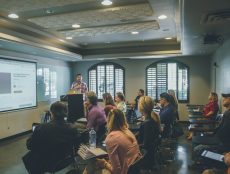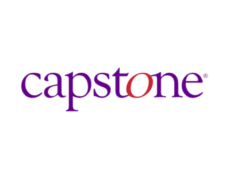
Articles
Interviews
Libraries in the Digital Age: A Conversation with Rachel Cobb
By Henry Kronk
April 16, 2018
As education technology continues to develop at a breakneck speed, it forces us to reimagine the education process from top to bottom on a daily basis. Edtech may change how we perform a given task, but it often leaves basic roles intact. Teachers still teach. Learners still learn. This is no less true with libraries and librarians. I recently sat down with Rachel Cobb, a librarian at the City of Wolverhampton College Study Hubs. Besides several other roles and accomplishments, she also runs a blog, Librayray.
Are Libraries Sustainable?
Henry Kronk: From your blog post, I get the sense that you love traditional libraries and what they do, but you also recognize that they can’t last in their current form. Is that accurate?
Rachel Cobb: Libraries are my everything. Libraries, at their very core, whether considered figuratively or literally, are an environment in which one can learn, prosper, and grow. If you delve a little deeper, traditionally, they were, and are still, an environment built to serve their public.
Yet, in recent times, we are learning they were not built as sustainable establishments. They are rarely malleable enough to undertake the amount of change required of them to be a necessity, or even a luxury. Although the books may no longer form the key function for many, the library should remain the same in essence. The introduction of the internet and incredible advances in technology in such a small space of time should not alter what a library is, and that is my qualm.
I appreciate that the libraries, and the staff within them, must change with the times; we must learn to use technology in all its glory and become connectors or bridges, between information and those seeking it, rather than owners as previous. Yet, in adapting in this way, we must not lose our identity, as I feel is happening now. This is due to a number of reasons and, of late, I have been reflecting on how much we are to blame for that rather than everyone and everything else. Is our demise due to our inability to act efficiently or even effectively? I don’t think so, but I know we can do more.
“The internet infiltrated our niche and filled it to bursting. We, as people, were no longer extraordinary. As the internet rises, we shrink. We lose who we are.”
HK: In what ways do you feel like librarians and libraries are losing their identity?
RC: So many people in society today seem to think that our role is redundant. It breaks my heart. We (librarians) used to fill a void. We were specialists in our field; purveyors of knowledge. People looked at us with a glint in their eyes; we were intellectual as well as wise, motivated, and helpful. We dealt with scarce resources. We had books. Yet, scarcity turned into abundance. The internet infiltrated our niche and filled it to bursting. We, as people, were no longer extraordinary. As the internet rises, we shrink. We lose who we are.
 However, that is not the end of our story … I feel.
However, that is not the end of our story … I feel.
We can keep up with the times and still be specialists at helping people find the resources they need, even if solely online. Unfortunately, that is not our only hurdle. Libraries are being devolved; they are merging with galleries and museums etc. forming community “hubs,” or volunteer-led establishments. How can we still hold onto our identity when so much of who we are is deemed unnecessary?
A whole minus a piece is a fraction of its former self.
Furthermore, the powers that be dictate our role to us in any case. We change our responsibilities and tasks according to top-tier managers who have little knowledge of what a library is meant to be. They think they know best, know what will drive user numbers, but this is rarely the case. In how many other professions do individuals change their modus operandi, their ethos, their activities daily, without prior thought or consideration? We are acting as though in a blind panic, as a result of all of these barriers combined. We need to reflect, take a step back, rediscover our worth, then find our voice and act with momentum.
Librarians and Media Literacy
HK: One of my most memorable experiences with a librarian was when I was — I think — about 10 years old. Our class went to the library and a librarian talked to us about research online. They began by showing us a site about whale watching in the Great Lakes. There are, of course, no whales in the Great Lakes. It was my first introduction to fake news. It seems to me like librarians’ role, generally, doesn’t need to change in essence. I believe you still can be advocates and facilitators of media literacy and can help learners cut through all the garbage online to get to the good stuff.
RC: Exactly! We just have to convince others of this and truly believe it as a group of not-so-timid individuals, despite the librarian stereotype!
I believe the obvious answer to enhance media literacy, especially within education, would be to utilize us. Although the changes in our role are often begrudged within the field, many can agree that computer literacy and media literacy are imperative and we can help. It seems like the logical progression as we enter an uncertain future, even this step requires considerable effort.
Can Libraries Ever Be ‘Remote?’
HK: Ok – different topic. As you say in your blog post, libraries as we know them may soon be a thing of the past. They might move entirely online. Do you see yourself ever working as a ‘remote’ librarian, much like an instructor who teaches an online course?
RC: The vastness and complexity of technology evokes a sense of fear within me personally. I have never been a huge fan of tech. I feel it comes naturally to some, and as much as I wish I was in the collection of tech-savvy librarians, I have to work at it.
That being said, I immerse myself in being the best librarian I can be. I thrive when pushing myself and feel any librarians out there who are scared to face it should follow my lead! If I can do it, you certainly can! The article I read the other day still sticks out in my mind here. Meredith Farkas, Head of Instructional Services at Portland State University (in 2013) explained, “The mainstreaming of online learning into the fabric of higher education requires all librarians to become distance learning librarians, making support for online learners just another thing we all do.”
I cannot help but feel that this applies so clearly to every librarian and their need to facilitate online learning for the masses. I often reflect on the concept of “library as place” i.e. does a library still exist without the 4 walls? I am biased, of course. I love the warm sensation you get when you enter a library; a room encapsulating innovation and self-development. I question if a screen can ever offer the same raw emotion. Yet, I fully appreciate the need for us to try to incorporate the internet into our role.
I, myself, would consider working remotely. I love to watch students become self-actualizing before my eyes. Yet, perhaps the same (rather self-indulgent) feelings of joy, when enabling someone to develop, can be achieved online. I know I need to adapt and practice what I preach. As the editor for the Study Hub Moodle pages (student VLE), as well as Online Presence coordinator, study skills can absolutely be taught online. As long as there are effective communication channels, there are few issues with this. The same applies for many courses.









No Comments